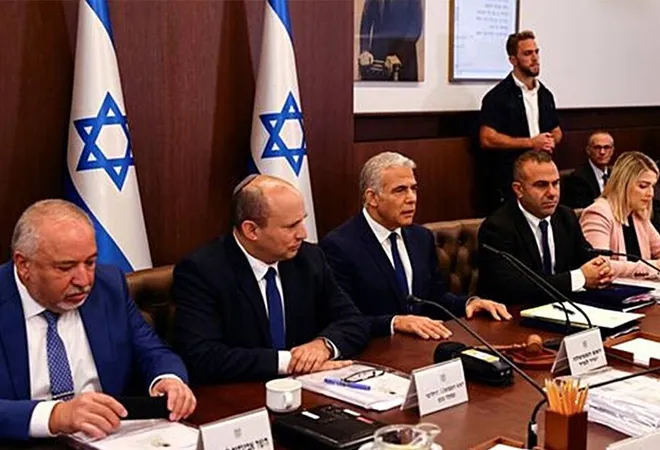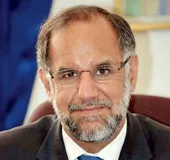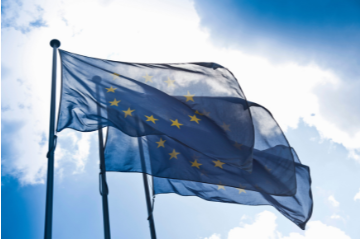The announcement on October 11 that Israel and Lebanon have finally reached an agreement over their maritime boundary may offer a rare piece of good news for Europe. The US-brokered agreement will allow the two countries to start exploiting the potential of the Karish and Qana gas fields in the Mediterranean. Reports indicate that exports of gas from Israel’s Karish field could start as early as November 2022 and even though the quantities won’t be very large, they do hold out the psychologically-important message of reducing Europe’s energy dependence on Russia.
The agreement has been termed “historic” and probably deserves that appellation for a couple of reasons. Since Lebanon and Israel don’t have diplomatic relations and are technically still in a state of war, any formal agreement represents a breakthrough and a possible easing of tensions. It is also historic because Hezbollah has chosen to maintain a diplomatic silence that is seen as tacit approval of the agreement despite its stated unhappiness over the acceptance of “Line 23” as the maritime boundary and had sought “Line 29” to press a more expansive claim that would have included parts of the Karish field and complicated the task of exploiting it. This is significant because until recently, Hezbollah had been threatening attacks on the oil installations if Israel started shipping the gas without an agreement in place and had even launched unsuccessful drone attacks against the installations. A strong Israeli reaction could have become another flashpoint between the two countries. Instead, the compromise has allowed both sides to declare victory.
Since Lebanon and Israel don’t have diplomatic relations and are technically still in a state of war, any formal agreement represents a breakthrough and a possible easing of tensions.
The availability of a lucrative and ready market in Europe and the unstable political situation in both countries imposed a tight timeline for concluding the agreement. In Beirut, President Michel Aoun completes his term in office on October 31 and by allowing Lebanon to start exploration and production from the Qana field, the deal brings a sliver of optimism in a country facing an unprecedented economic crisis. The alacrity with which a high-level team from France’s TotalEnergies arrived in Beirut the day after the announcement also helped, even though it will still take several years before any production actually comes onstream. In Tel Aviv, the government of Prime Minister Yair Lapid is also on its last legs and Israel will host its fifth round of general elections in a of four years in November. While opposition leader and former Prime Minister Benjamin Netanyahu has attacked the agreement as “surrendering to Hezbollah’s blackmail”, and threatened to cancel it if he comes to power, it does allow Israel to move ahead with production and removes the Hezbollah threat to its increasingly significant gas infrastructure.
For Israel, Karish and the neighbouring Tanin fields provide an estimated 2-3 trillion cubic feet of gas. It also gets an as yet unspecified share of royalty from the Qana field since a small part of it now falls within Israel’s Exclusive Economic Zone. While not as large as its Leviathan and Tamar fields, the addition does signal the country’s growing stature as a gas exporter in the southern Mediterranean. Unlike Lebanon, which currently lacks a viable export route for any gas that it might find in Qana, Israel benefits from the fact that it has the East Mediterranean Gas (EMG) pipeline to provide a relatively short and easy route from Ashkelon in Israel to El Arish in northern Sinai and onwards to Egypt’s two LNG plants near Alexandria. As a result, its gas exports are already up by 22 per cent in 2022.
The alacrity with which a high-level team from France’s TotalEnergies arrived in Beirut the day after the announcement also helped, even though it will still take several years before any production actually comes onstream.
The Ukraine conflict has also provided Egypt the opportunity to increase its LNG exports to Europe and also correspondingly expand its import of natural gas from Israel to almost 720 million cubic feet per day. The surge in imports, in fact, has outstripped the capacity of the EMG pipeline and has been possible only because the Arab Gas Pipeline (AGP) built to take Egyptian gas to Lebanon and Syria has been partly used for a reverse flow of Israeli gas to Egypt from its Red Sea junction at Aqaba to El Arish.
Egypt is also in the process of expanding output beyond the current level of 2.7 million cubic feet per day from its own Zohr gas field, reputed to be the largest in the Mediterranean with estimated reserves of 30 trillion cubic feet. With the Egyptian pound depreciating rapidly amidst an array of economic challenges, President Sisi’s government is keen to earn precious hard currency from gas exports to Europe. But with a population of 104 million people that is growing at the rate of a million every seven months, domestic gas consumption has grown by 35 per cent since 2015 and the idea of increasing gas exports at the cost of a shortage within the country is a politically sensitive one.
Russia’s invasion of Ukraine and the resulting energy crisis in Europe has so far followed the law of unintended consequences. It has enabled Israel and Lebanon to reach an agreement that had eluded them for almost a decade, offering economic and security benefits to both states. It has also strengthened the energy linkage between Israel and Egypt, finally providing some substance to a relationship that has mostly been characterised as a cold peace ever since the Camp David accords of 1979. And the shuttle diplomacy undertaken by special envoy Amos Hochstein has demonstrated that the US can still serve as the occasional honest broker in the region. Yes, challenges remain and some decisions, particularly related to royalty shares from Qana, have been left undefined for now. But for now, the Ukraine crisis and the economics of natural gas have unexpectedly come to the aid of West Asia’s troubled geopolitics, even if in small measure.
This commentary originally appeared in The Indian Express.
The views expressed above belong to the author(s). ORF research and analyses now available on Telegram! Click here to access our curated content — blogs, longforms and interviews.




 PREV
PREV


